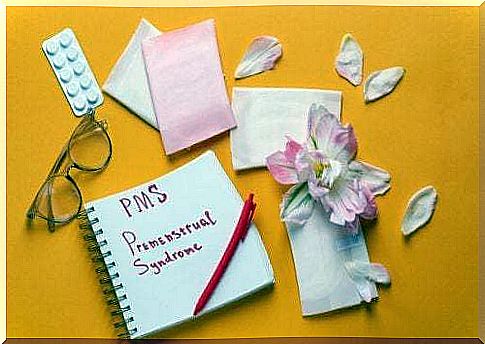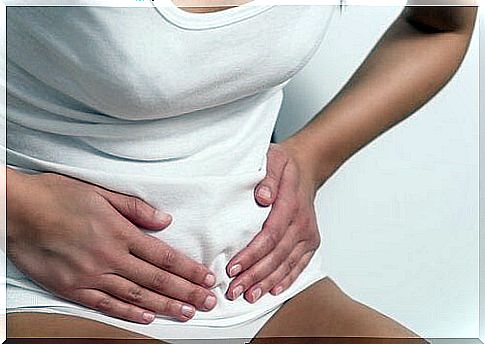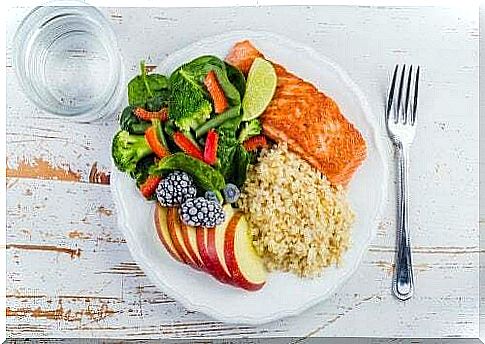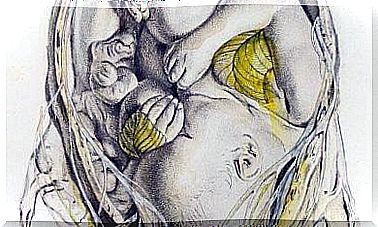Nutrition To Relieve PMS

PMS is a set of physical, psychological and behavioral symptoms that affect 80% of women. It is important to know that the severe form is known as premenstrual dysphoric disorder and that this affects 1.3-5.3% of the population. Know that feeding to relieve PMS can sometimes be effective.
These symptoms appear in the luteal phase (after ovulation) and end 2 or 3 days after menstruation. If you are tired of taking anti-inflammatory drugs and painkillers, read on, as you can use nutrition to relieve PMS .
Clinical symptoms of PMS
PMS occurs with at least one of the following symptoms:
- Abdominal swelling.
- Breast pain.
- Headache.
- Muscle or joint pains.
- Water retention.
- Weight gain.
- Anxiety.
- Lack of concentration.
- Fatigue.
- Irritability and mood swings.
- Sadness.
These symptoms usually occur for at least 3 consecutive cycles. On the other hand, in PMD, there must be at least 5 symptoms.

Causes of PMS
It all depends on the hormonal ups and downs of estrogen and progesterone. During this phase, estrogen is low and progesterone is at its peak. Consequently, they act by altering the levels of neurotransmitters such as serotonin, dopamine and GABA, whose function is to regulate mood. Blood pressure is also altered.
Through all of these processes, nutrition to alleviate PMS can provide nutrients to counteract and reduce symptoms. These nutrients tend to decrease during this time. Therefore, other risk factors are tobacco and stress.
Nutrition to relieve premenstrual syndrome
Why is it essential to include foods rich in Omega 3 in the diet to relieve PMS? Basically, because it is an anti-inflammatory that acts on the brain by increasing concentration. Omega 3s are essential for reducing the severity and duration of bad mood, bloating and anxiety.
Foods rich in Omega 3 are blue fish (sardines, salmon, anchovies and tuna), nuts (especially almonds), seeds. The benefits of evening primrose oil, which contains linoleic acid, are also known.
How to control mood with vitamin B6
Vitamin B6 is a co-factor involved in the synthesis of tryptophan, a precursor of serotonin and dopamine. During the premenstrual phase, these neuro transmitters are low, so we are more sensitive, easily aroused and sad.
Vitamin B6 is contained in bananas, oat flakes, pure cocoa, pineapple, salmon, eggs and avocado.
Magnesium in the diet to relieve PMS
Magnesium reduces muscle pain and is part of the diet to relieve PMS.
Magnesium is a mineral whose blood levels are reduced during this phase. With a deficit, aldosterone increases, causing an increase in water retention and, in turn, a decrease in dopamine.
Also, its main function is to make muscle fibers communicate with each other, so if we don’t have enough reserves, cramps appear. Magnesium is found in seeds, legumes, millet and quinoa.

The synergy between calcium and vitamin D
As has already been mentioned, estrogen during the premenstrual phase is low. So what happens? First, it increases the PTH hormone, making it difficult to absorb calcium. If vitamin D is also lowered, the situation worsens. Therefore, it is essential to consume foods such as broccoli, cabbage, almonds, beans, yogurt and goat cheeses, as well as oily fish and eggs. Also, don’t forget to expose yourself to the sun for at least 15 minutes a day.
Foods that aggravate PMS
As with any medical condition, there are foods that negatively affect the development and intensity of PMS. The following stand out in particular:
- Alcohol.
- Coffee and energy drinks containing caffeine, which generates a decrease in B6 reserves. An alternative is to drink decaffeinated coffee or infusions.
- Cold soft drinks.
- The pastries, including cookies.
- The foods to fast food (pizza, hamburgers …).
- Salty snacks.
- Fried foods.
Exercise to relieve PMS
In addition to nutrition, exercise has a relaxing, anesthetic, anti-inflammatory effect and improves mood by stimulating the production of endorphins. In addition, it also has positive effects on physical and metabolic health.
-Dr William C. Roberts-
It is worth playing sports at least 3 times a week, doing aerobic exercises, such as running, walking or cycling. It is also recommended to combine these exercises with those that require strength.
Here is everything you should know about nutrition to relieve PMS. Remember to always take care of yourself and rest to regain strength, as we often forget the importance of rest.









